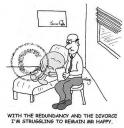The quest for happiness; is this the meaning of life?
We live in a time like no other. We’ve essentially won the struggle for life and dominated the planet and now we wonder what the real purpose of life is. I could say that «the point of life is to live». You may think that’s a bleeding obvious statement, but to succeed against all the odds in the fight for survival is essentially the point of life; it’s what gives us our happiness.
We are told from a very early age that to make it in the world, to get what you want will make you happy. Once you are ‘rich, successful and healthy’, you can then live happily ever after. Although clearly that isn’t always the case. Western cultures have the highest standard of living than ever before and the longest lifespans, but coincidentally, the same advanced societies also have the highest rates of medically diagnosed depression ever to be recorded. This begs the question: are we fundamentally happier as a result of the comfortable lifestyles we have attained for ourselves?
The actual pursuit of happiness is and always will be a relentless quest. Happiness is not a permanent state because our life struggle is in a permanent state of flux. To be alive & healthy, with a positive vision of future survival, is to be happy. So it recently occurred to me that the real meaning or aim of our lives is the search for happiness. Think about it. People pursue happiness above all else - it’s what motivates us. We intentionally make important decisions which we believe will in some way ultimately increase our happiness. You may confuse money with happiness, as the former is viewed as one measure of success, but don’t get distracted. Delving a little deeper into this theme, here are a few examples:
People collect things because it makes them happy. People over-eat because they enjoy it & therefore it makes them feel happy (if only temporarily). People under-eat because they feel that their figure will make them happy. People take all kinds of drugs in an attempt to momentarily peak their happiness. People who have faith in religion definitely feel good about themselves, deriving some kind of pleasure out of their beliefs. People do things for other people because it makes them feel happy. People get addicted to consumerism when they think that owning something new will contribute to their happiness. Masochists derive pleasure (or happiness) from pain. Even seemingly miserable self-defeatists or people with low self esteem who dwell in constant self-pity secretly hope that someone else will notice their situation, identify with it and then help them feel happier about themselves. I could argue that grumpy people are happy being so inclined. My point is, even those who don’t pursue happiness directly are subconsciously and indirectly seeking it out.
The trouble now is that we are too successful, our lives are not in jeopardy, and we demand more and more pleasure-seeking activities to compensate. For some people, living has become too easy. Their survival, financially speaking, is completely taken for granted -not even considered. And notice that sometimes, these are the unhappiest people of all. They have such an insatiable desire for a better standard of living, all this serves to do is make them even unhappier. Happiness comes from the [successful] struggle for life, of life, not the eternal search for new possessions. Lately, we’ve forgotten the true meaning of life: that survival is happiness.
Owning too much stuff drives us into a spiral of sadness, says a new book. Or is the real problem «misery-creep«, where everyday unhappiness is being rebranded as depression?
The citizens of selfish capitalist countries are twice as likely to suffer from a mental illness as the citizens of countries in mainland western Europe, which practise ‘unselfish capitalism’.
«In my trade, for example, states of sadness are now seen as ‘depression’, shyness has become ‘social phobia’, and all sorts of variations in childhood temperament, personality, emotions and behaviour have become characterised as diseases that need treatment, be it Asperger’s autism or ADHD.»
«Therapy culture» means that people now regard as abnormal things that «previous generations regarded as part and parcel of normal variations in personality and emotion». So what earlier generations saw as an everyday struggle to make ends meet might now be referred to as stress or workaholism. Source: BBC News




To find the meaning of Life, I try to feel the sense of satisfaction when I do what I love doing. Love the people around me. Teaching good things to the children. That’s what Life is to me.